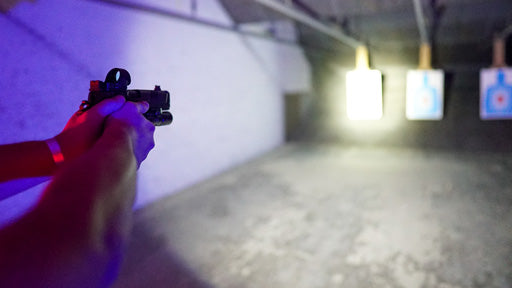
You've just shot an intruder in self-defense. Now what?
If you find yourself in the unfortunate situation of having to use deadly force to protect yourself or your loved ones from an intruder, it's important to understand the legal steps you should take to protect yourself in the aftermath, as well as some precautions you may want to consider as a gun owner.
First and foremost, after the shooting, stay calm and call the police immediately. The police will arrive and begin an investigation into the incident. While it may seem convenient to cooperate with the police and answer their questions, remember that self-defense laws vary from state to state. Unless you're an expert in federal and local statutes, you have the right to remain silent and have an attorney present during questioning. This is especially important considering you were just involved in a fatal shooting. Your adrenaline will be pumping, and you'll most likely want to gather your thoughts and composure before making an official statement. And, it's a good idea to get legal advice from a professional.
Once the police have completed their investigation, the case will be turned over to the local prosecutor, who will decide whether or not to bring criminal charges against you. In most states, the use of deadly force in self-defense is justified if you reasonably believed that you or someone else was in imminent danger of death or serious bodily harm and that the use of deadly force was necessary to prevent that harm.
If the prosecutor decides to bring charges against you, you'll have the opportunity to defend yourself in court. It's important to have an experienced criminal defense attorney represent you during this process. Your attorney will be able to explain the legal justification for your actions and help you present your case in the best possible light.
In the meantime, it's also a good idea to contact your insurance company to inform them of the incident. Many homeowner's insurance policies have provisions for covering legal expenses in the event of a self-defense incident. It's important to understand what your homeowner's insurance policy covers and if you need supplemental insurance.
Gun owners insurance, also known as firearms liability insurance, is a type of insurance specifically designed to protect gun owners in the event that they are found liable for damages or injuries caused by their firearms. The insurance typically covers legal fees, settlements, and judgments related to a shooting incident. If an intruder or their family members file a lawsuit against you, this insurance would help cover the cost of the legal defense and any financial settlements or judgments that may result from the case. However, keep in mind that the coverage and terms of gun owners insurance vary depending on the insurer and the specific policy, and it may not be available in all places.
One example is when an insurer denied coverage for a shooting incident because the policy excluded coverage for intentional acts. In this case, the gun owner had shot and killed an intruder in their home, but the insurer argued that the shooting was an intentional act and therefore not covered by the policy.
Another example is when an insurer denied coverage for a shooting incident because the policy had a clause that only covered the legal defense if the insured person is found not guilty, and since the policy holder was found guilty in criminal court, the insurer denied the coverage for the legal defense in civil court.
These situations can be very difficult and stressful for the gun owner, and can also result in significant financial losses if they are found liable and are not covered by their insurance.
The best way to determine which insurance company is the best for you would be to research various companies that offer firearms liability insurance and compare their coverage options, exclusions, and rates.
It could be beneficial to consult with a professional insurance broker who specializes in firearms liability insurance and can help you understand the coverage options, exclusions and cost of different policies.
You could also consult other gun owners,gun rights organizations or firearms trainers and instructors, they could give you some feedback based on their experience.
When researching insurance companies, it can be helpful to consider factors such as:
- The company's financial stability, as this can affect their ability to pay out claims.
- The company's reputation for handling firearms-related claims.
- The policy exclusions and limits for firearms-related incidents,
- The company's customer service and claims handling process
- The cost of the policy in comparison to other options.
- It's important to note that the best insurance company for one person might not be the best for another person, depending on your unique circumstances.
Lastly, it's important to reiterate that the surviving family members of the intruder may file a civil lawsuit against you. This is a scenario that many gun owners do not consider before making the decision to purchase a firearm. It's important to understand the potential legal risks and to consult with an attorney who has experience with firearms-related cases and can help you understand your legal options and build a defense strategy.
It's also important to keep in mind that a civil suit is different from a criminal one, a successful defense in a criminal court does not mean the same success in a civil court and vice versa. Also, in a civil suit the burden of proof is lower than in a criminal one.
If you find yourself in a situation where you have to use deadly force in self-defense, it's important to remain calm, call the police, and understand your legal rights. Get legal advice from a criminal defense attorney and inform your insurance company of the incident. Make sure to have a good understanding of your homeowner's and firearms liability insurance policies and their coverage, terms and exclusions. And, be aware that the family members of the intruder may file a civil lawsuit against you.
DISCLAIMER: The information provided above is for general informational purposes only and should not be taken as legal advice or as a substitute for legal advice from a licensed attorney. The laws regarding the use of deadly force and self-defense vary from state to state, and it is important to consult with a qualified attorney who is familiar with the laws in your jurisdiction. Additionally, the information provided is based on the law at the time of my knowledge cut off, which is 2021 and might not reflect the current laws or situations. Laws can change over time, it's always a good idea to consult a legal professional before taking any action.



Leave a comment
This site is protected by hCaptcha and the hCaptcha Privacy Policy and Terms of Service apply.